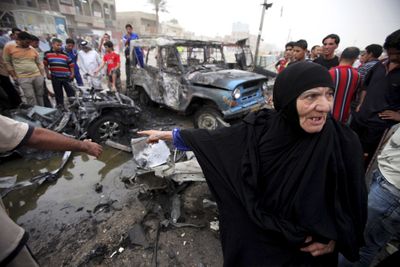Baghdad suffers multiple bombings
Fatalities have steadily risen this year

BAGHDAD – April was the bloodiest month Baghdad has seen in more than a year, but President Barack Obama said that while recent bombings are “a legitimate cause for concern, civilian deaths … remain very low compared to what was going on last year.”
The worst of Wednesday’s explosions took place in Sadr City, a sprawling Shiite Muslim slum in east Baghdad. Three bombs hidden in parked cars detonated in quick succession along a busy commercial street around 5 p.m., an official with Iraq’s interior ministry said.
At least 43 people were killed and 68 injured. Authorities said they expect the death toll to rise.
“It was chaos in the streets,” said one witness, Wissam Hassan.
Two more car bombs detonated in Baghdad’s Hurriyah neighborhood Wednesday night, killing at least two people and wounding eight.
Wednesday’s attacks are the latest sign that Iraq’s security gains are beginning to reverse. Large-scale bombings targeting civilians have been on the rise since March, and there is widespread concern among Iraqis that the violence may quickly spread as the U.S. begins to withdraw.
In Baghdad alone, more than 200 people have been killed in attacks so far this month, compared with 99 last month and 46 in February, according to a McClatchy Newspapers count.
The last time McClatchy recorded more than 200 civilian deaths in one month in the capital was more than a year ago, in March 2008.
American officials have said they don’t think the renewed violence marks a serious setback.
During a visit to Baghdad last week, Secretary of State Hillary Clinton told reporters the spike in attacks is not an indication that Iraq is regressing. She said she and Army Gen. Raymond Odierno, the top U.S. commander here, agree that the uptick in bombings shouldn’t change American plans for withdrawal.
Outside analysts aren’t so optimistic.
Michael O’Hanlon, a senior fellow and Iraq expert with the Brookings Institution, called the rise in violence “significant.”
“There almost surely won’t be a complete reversal” in the progress that’s been made, he said in an e-mail. “But there could be an end to the progress and even a new, somewhat higher level of ongoing violence.”
At his Wednesday night news conference, Obama said that the political system “is holding and functioning in Iraq.” He also said that there’s some “serious work” to be done on how the country’s oil revenues should be shared, on the powers of the central and provincial governments, on relations between the Kurds and the central government, and on how former Sunni Muslim militiamen should be incorporated into the Shiite-dominated Iraqi security forces.